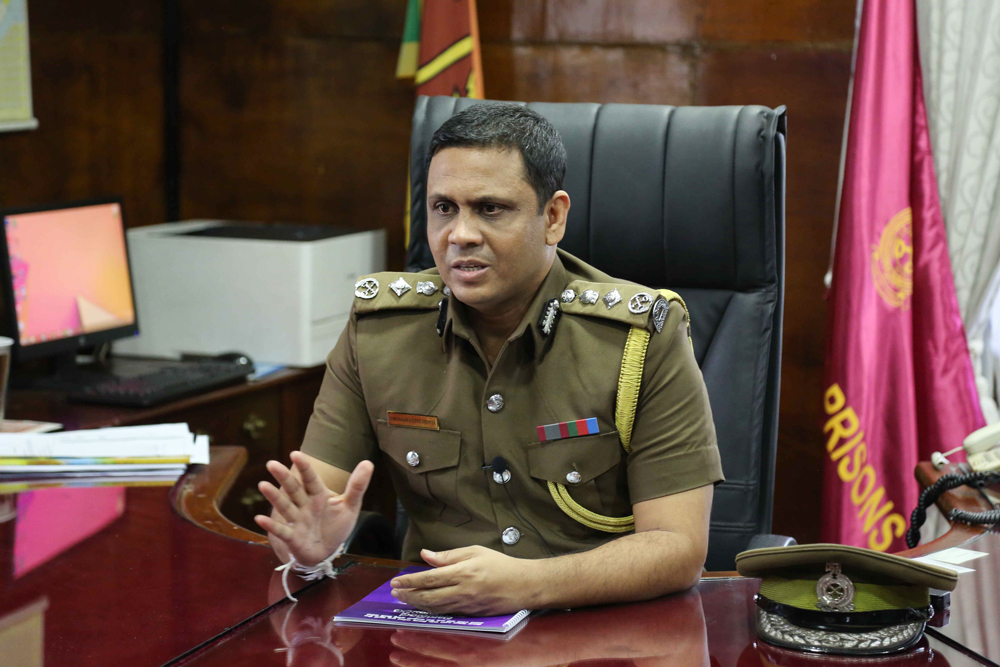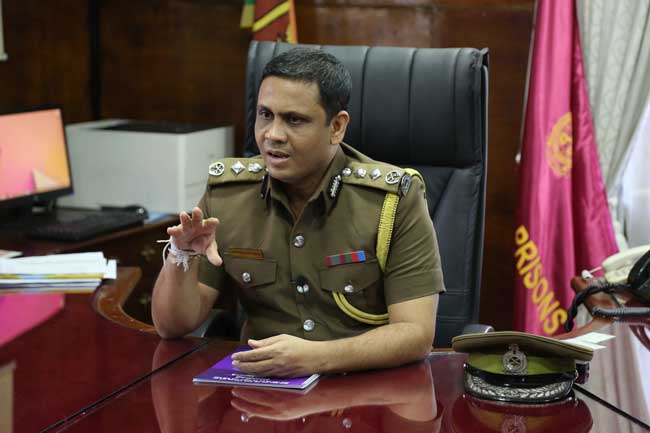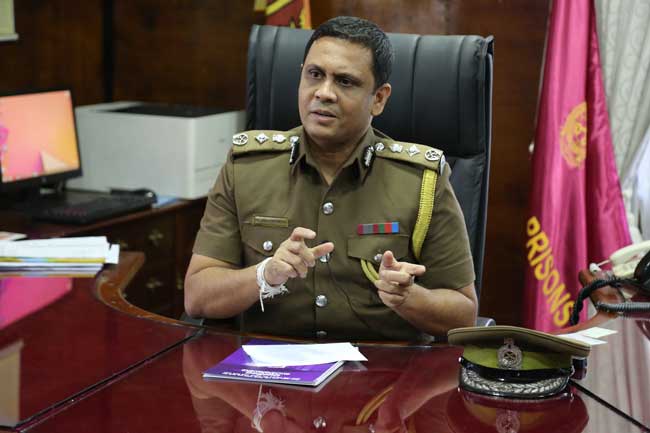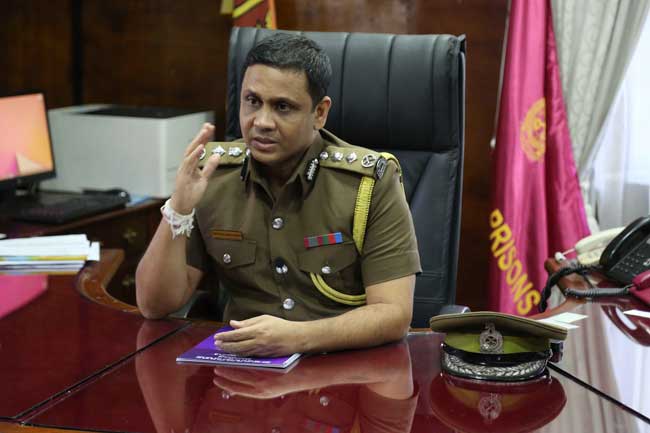Cleansing corrupt prison system, the top priority – Prisons Commissioner General Upuldeniya
June 29, 2020
With the final nod received from President Gotabaya Rajapaksa to make prisons free of corruption, the newly appointed Commissioner General of Prisons, Thushara Upuldeniya said he and his team of officials would take strict measures to curb deep-rooted corruption to overhaul the 200-years-old prison system to give it a new look.
“Nothing could prevent us who are doing the right thing to prevent corruption in the system that has threatened the country’s national security,” he said.
In an interview with the defence.lk he spoke about a wide range of issues from overcrowding in prisons to rehabilitation of drug addicts to precautions taken to keep underworld kingpins under its microscope, digitizing the prison system to converting the system to correction centres to give a more humane touch to the existing prison system on par with international standards.
For public complaints on irregularities in prisons or allegations against prison officers, dial 0112678600, which has been set up at the special unit for public complaints, which will be immediately looked into.
Following are the excerpts of the interview:
Q: What are the main challenges in managing the country’s prisons?
A: Overcrowding in prisons is the main challenge that we are facing today. If we take Colombo Remand Prison and Welikada Prison, they are over 300 percent overcrowded and all the prisons in the country are overcrowded by 173 percent. This is a long-felt need and the biggest challenge that we need to solve as the prisoners are living in highly congested cells.
This is mainly due to high daily prison admission, especially with those who are sent in for short period imprisonment. The majority of them are given imprisonment due to their inability to pay fines and bail charges.
In the Colombo Remand prison, inmates suffer badly due to overcrowding and lack of space to sleep and basic hygiene facilities.
The second challenge is the shortage of prison staff. At the moment we lack 1,500 prison guards to manage prisons islandwide.
Q: According to the present situation, another deep-rooted challenge is making prisons free of corruption. How do you address this ?
A: The department has to adopt many strategies to overcome corruption in the prison system. We are now analyzing the situation to train the prison staff and also to upgrade their knowledge in laws related to corruption and other malpractices.
I believe that when they are more aware of the punishment and laws and regulations related to corruption, most of them will not be engaged in illegal deals.
On the other hand, we have to make the prison environment demotivate the prison staff getting involved in corrupt practices. Before I took office, the environment in prisons was motivating jailors to have a hand in deals as most of the drug traffickers, smugglers, underworld gang criminals were offering them bribes to get illegal items into the prisons. We are taking measures to strengthen the capabilities of our officers to fight against corruption.
Q: You said some underworld kingpins are offering some bribes to prison officers. How do you tackle this?
A: We should make our prison officers aware of the seriousness of getting involved with notorious criminals. We are very watchful and will not leave room for them to get involved in such corrupt practices. As prison officials, we are accountable for handling prisoners well and also to correct them. The department would take tough measures against such corrupt prison officials.
Q: As a member of the recently appointed Presidential Task Force to build a Secure Country, Disciplined, Virtuous and Lawful Society, how does the Prison Department contribute to the desired outcome?
A: This is a good initiative because the Prison Dept can closely work with the security agencies and law enforcement authorities in the country to bring a secured nation. We have already identified our challenges and the means of meeting those challenges. We are also sharing our knowledge and information with other experts and agencies which are working to curb crimes and illegal activities. In this system, the Prison Department has a major role to play to reach the desired outcome of the PTF.
Q: You mentioned overcrowding in prisons as one of the main challenges. What are the plans to ease the situation in prisons?
A: I have discussed this matter with members of the Task Force. Definitely, we want to relocate these prisons in urban areas because there is no space to expand prisons. Buildings are too old. We should identify new lands for our existing lands to expand those prisons.
On the other hand, we should address the legal causes for prisons being overcrowded but this issue is beyond our control. Therefore, we need assistance from the Police, Attorney General’s Department and other law enforcement agencies to address this issue.
Q: Do you think overcrowding is also due to laws delays?
A: Yes, to some extent. There are many cases pending and delaying due to laws delays. We are closely working with the Justice Ministry to solve pending cases soon.
Q: Recently, Boossa Prison was turned into a prison for hardcore underworld criminals and noted drug traffickers. Do you have plans to call the military to provide extra security for this prison?
A: No. The Boossa Prison has now been converted into a super-maximum prison, which has been set up to imprison high profile, notorious prisoners. In the Boossa Prison, our jailors and the STF are handling security inside the prison. The military has not been assigned for any task to maintain security in prisons.
Q. As a former prison’s intelligence officer, how effectively you can use prison’s intelligence unit to control corruption in prisons?
A: Yes, prisons intelligence unit can play a vital role in curbing corruption within the prison system. I have plans to strengthen prison intelligence system by linking it with the country’s other intelligence agencies to have a better coordination and network.
We will also train them on how to identify corrupt practices, which are changing time to time by the prisoners and also by the prison officers. We are also paying extra attention to the behavior of the prisoners and new trends that may be developed within prisons.
We are closely working with the national intelligence agencies, which are willing to train our officials.
Q: Why do you think that prisons officers are engaging in corruptions, is it because they are underpaid?
A: I can’t figure out one reason for this as there are many reasons. We should do a study into this to identify the real reasons.
Prison Department is one of the Government institutions among many other State institutions where corruption prevails.
I disagree that prison officers are getting low salaries. They are getting decent salaries and anyone cannot justify that they engage in corruption because they are underpaid.
My view is there should be a swift attitude change among the officers to keep the respect of the uniform that they wear. We have plans to tackle this and we will overcome this soon.
I have already discussed this matter with Prison Commissioner (Administration) and the Prison Training College and we are drawing plans to implement them in future. We will also get the support of the Police Department and the military to train our officers.
Q: What do you mean by changing attitudes among your officers?
A: Prisoners are the people who have lost their families, education, respect, income etc. Most of the prisoners have a low level of education although they are masterminds in crimes. Our officers should have a good education and professionalism to handle these inmates.
Therefore, we should have capacity building programs for our officers to make them more professional officers.
Q: Do you have plans to get foreign support to enhance their knowledge in serving in prisons?
A: Yes, we are having dialogues with some countries, which have established their correctional services. Recently, Maldives has changed their Prison Department to Correctional Services. This is what I need to do in the future. Therefore, we should convert our prison officers to correctional professionals.
Q: How do you differentiate a prison officer from a correctional officer?
A: A prison officer is taught how to handle prisoners physically in a professional way. A correctional officer needs to handle security as well as the prisoner’s emotions. He needs to be a person who can identify the feelings of prisoners and their behavior. He will be a person who will respect humanity.
Q: What are the welfare programs, you are going to launch to upgrade the standards of prison officials?
A: We have launched many welfare programs for officers within our limited budgetary allocation. But still, there are areas we need to upgrade to give them a better working environment. One major aspect we need to look into is accommodation facilities for them. I am sad to say that their living quarters are not at acceptable levels. Some officer quarters have poor living conditions than the prisoners’ accommodation. We need to address such issues as well.
Q: According to statistics re-conviction is high. Does this show that there are some lapses in the prison rehabilitation system?
A: When we compare statistics from other countries, there is no very much difference with Sri Lanka’s re-conviction rate, which is 39 % .Out of it, 80% are drug addicts, which make our re-conviction rate high.
We are proposing to separate drug addicts from other prison inmates and to have separate rehabilitation centres for them. On the other hand, our officials are well trained to handle criminals but not drug addicts as it is a special area that needs counseling.
The drug addicts are sent for three-month imprisonment and released back to the same society. Then within two weeks, they re-enter for the same drug-related offenses. This is the reason Sri Lanka records a high-reconviction rate.
Today, two rehabilitation centres – Ambepussa and Kandakadu- for drug addicts are functioning under the Prison Department and we are planning to have another centre at Weerawila to increase facilities to rehabilitate drug addicts and also to ease congestion in prisons.
Q: Most of the vocational training courses offered to inmates are not job oriented. Are you going to introduce vocational training opportunities to cater to the demand in the job market?
A: Yes, we are looking forward to have more collaboration with the private sector to introduce new training courses for prison inmates. A project initiated by the Board of Investment is going on in Mahara Prison and another similar project is going on now in the Welikada Prison with the help of the private sector. It is a cabinet approved private-public partnership program.
The Avant Guard is also providing a three-month job oriented training for the prison inmates in the Welikada Prison. This is an on-the-job training where the selected prison inmates work outside during the day time and return to the prison after work. They are entitled to a salary, which is deposited in their bank accounts and can withdraw it in an emergency requirement and also when they are released from the prison.
Q: You talked about digitizing the prison system. What is the progress of it?
A: We have initiated the Prison Information Management System. All the administration work from admitting a convicted person to a prison to discharging him will be included in the system. The department has already completed networking and finalizing infrastructure for the system.
Entering data into the system is remaining while digitizing 15 prisons are yet to be completed. We are planning to complete the entire process before the end of this year.
Q: Is there any facility for the public lodge a direct complaint to the department?
A: Yes, those who have complaints regarding irregularities in prisons or allegations against our officers, they can dial 0112678600, which has been set up at the special unit for public complaints, which will be immediately looked into.
The complainant could be a prisoner, a relative, an officer or an outsider and we will maintain 100 percent confidentiality on information that we receive to this unit.
Q: With the recovery of a ‘luxury cell’ in the Negombo prison, people are more inquisitive to know whether similar cells will also exist in other prisons.
A: No, it is not acceptable under the law and they had provided those facilities on the private interest of some officials of the Negombo prison. We have conducted an inquiry on this issue and have taken legal action against those who are involved in providing such facilities for the prisoners.
The department will not leave space for providing such special treatment for prisoners in any of the prisons in the future and will be treated equally to all prison inmates.
Q: A few weeks ago Defence Secretary Maj. Gen. (Retd) Kamal Gunaratne had made a public statement saying that tough action would be taken against those prison officials who were involved and support underworld criminals. What is your comment on it?
A: It is a good move as we also need to make the prison system free of corruption. We need to respect the law of the country first and the offenders should be subject to punishment under disciplined regulations. If prison officers are caught for such illegal activities, we would first conduct internal inquiries and then the case would be handed over to the Police to take legal action.
We have already interdicted few officials alleged to have involvements in illegal activities and tarnishing the image of the Prisons Department. The Police are probing into these cases.
There will not be any room for any officials to be engaged in corruption and also support criminals within the prison system. I will take stringent measures against corrupt officials among many officials who are committed and serving genuinely.
Q: President has appointed you to clean the prison system and to support government initiatives for a secured nation. Are you confident that you can deliver this endeavor?
A: Yes, I am fully confident that I can do my best to make the prisons system a corruption-free system utilizing my years-long knowledge, training, experience and capacity. I also get the full support of senior prison staff, who are also enthusiastic, to clean the system to protect the good name of the department.
Q: Previously, some genuine prison officers have received threats from criminals and did you and your officers receive any such threats so far?
A: Yes, I have heard that some officers had received some threats. But we will not stop our task fearing those threats. We have already started investigating on those claims. Nothing could prevent me and my team of officials who are doing the right thing to curb corruption in the system that have threatened the national security of the country.
Q: What kind of a prison system that you expect to have during your tenure?
A: All the prisons in the world are maintaining certain standards and mostly they apply ‘Nelson Mandela Rules’ to maintain prisons. The Bangkok Rules are applied to maintain prisons for females and Beijing Rules are applied for prisons for juveniles.
Therefore, we need to change our operations on a par with these international standards. Under those standards, it is not only developing infrastructure but also maintaining professionalism to make the entire prison system more humane to prisoners
Actually all prisons in the country should be converted into correctional centres, which will release good men back to the society and not criminals.


